【中考夺分天天练(译林·全国)】2014素材化中考英语总复习课件(含13年试题):模块3 [Units 1—3, Book 7B]
文档属性
| 名称 | 【中考夺分天天练(译林·全国)】2014素材化中考英语总复习课件(含13年试题):模块3 [Units 1—3, Book 7B] |  | |
| 格式 | zip | ||
| 文件大小 | 33.4KB | ||
| 资源类型 | 教案 | ||
| 版本资源 | 牛津译林版 | ||
| 科目 | 英语 | ||
| 更新时间 | 2014-02-13 17:13:29 | ||
图片预览

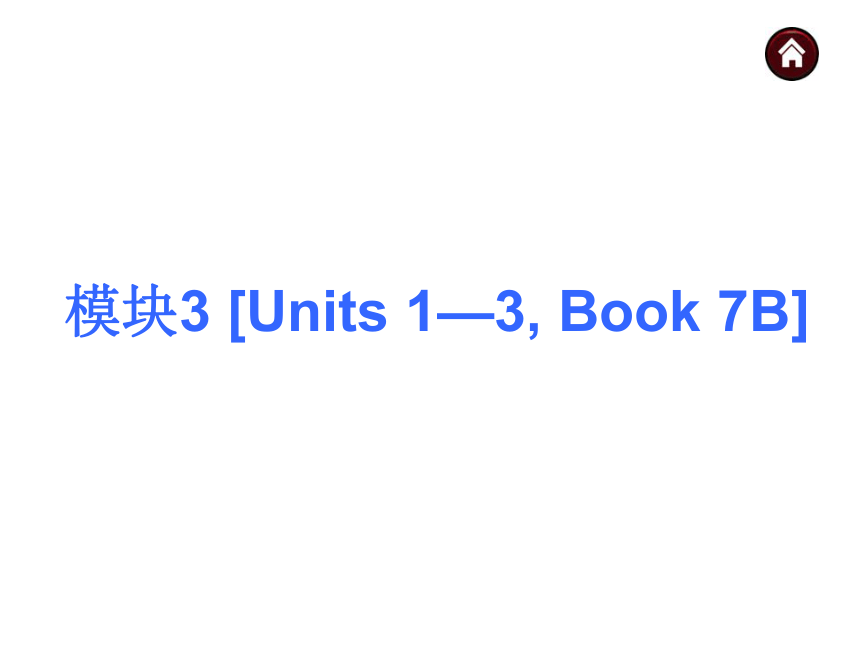
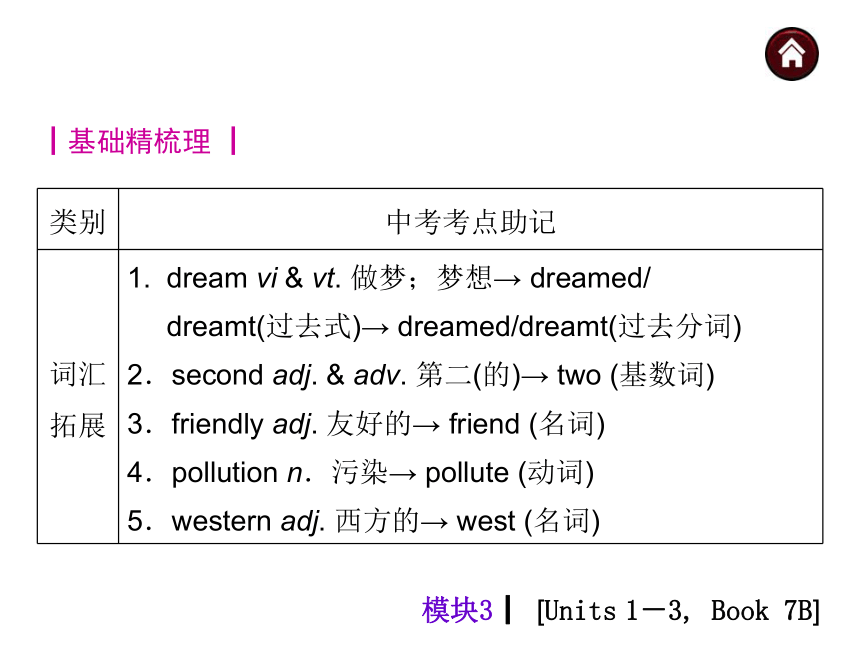
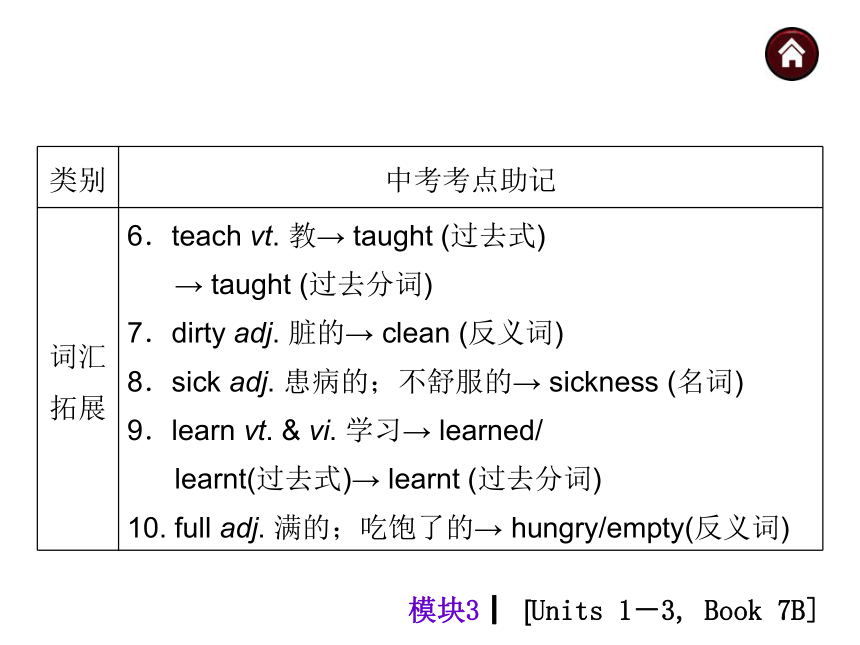
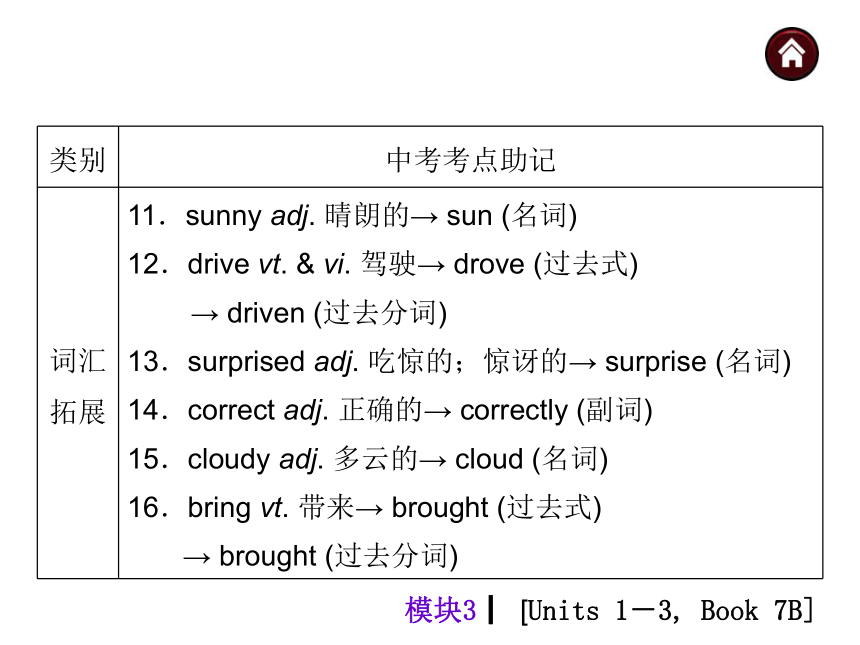
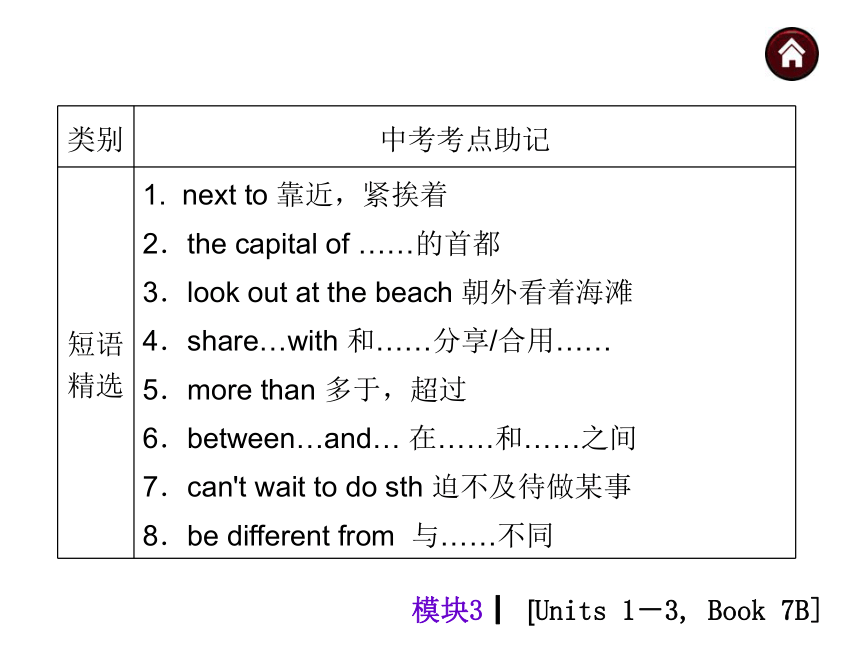
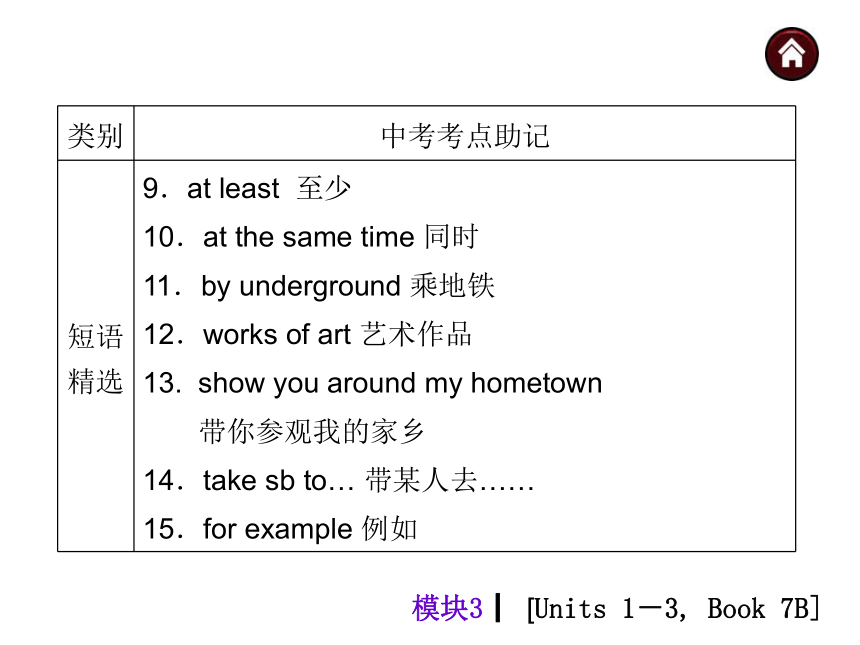
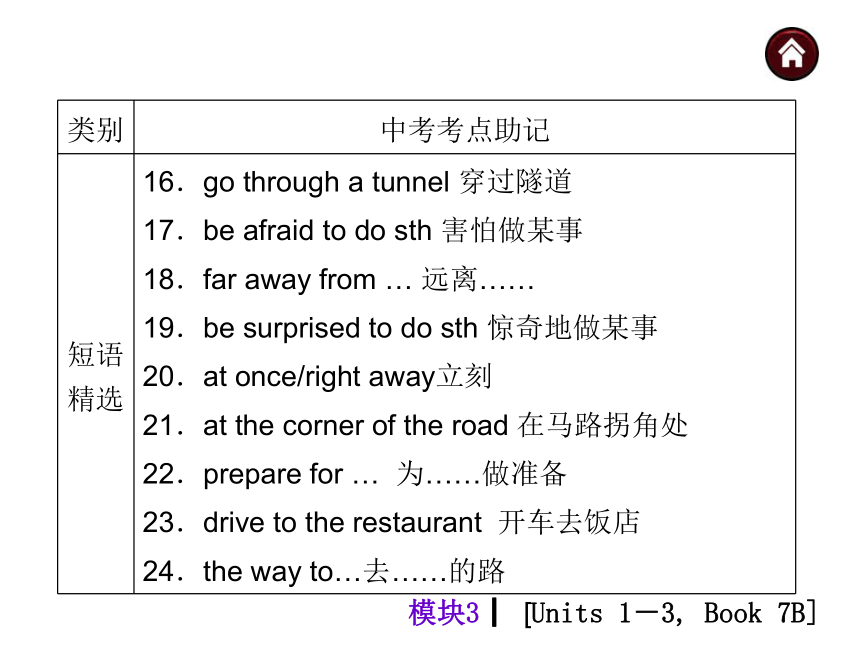
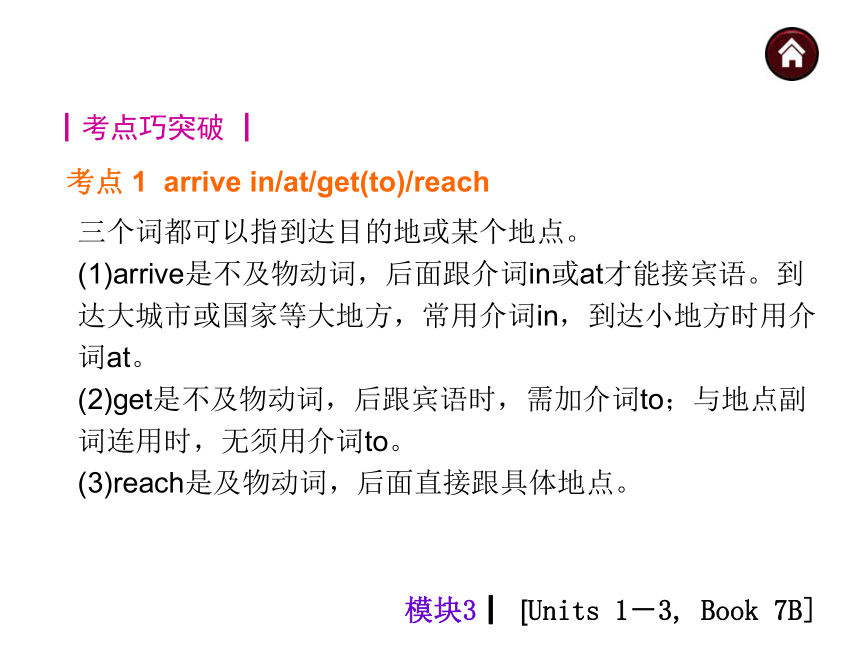
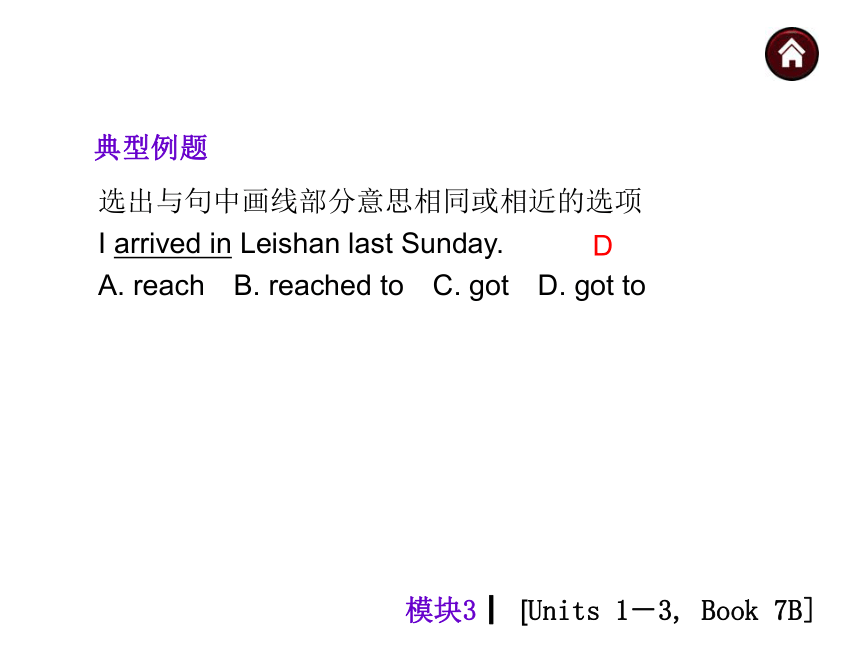
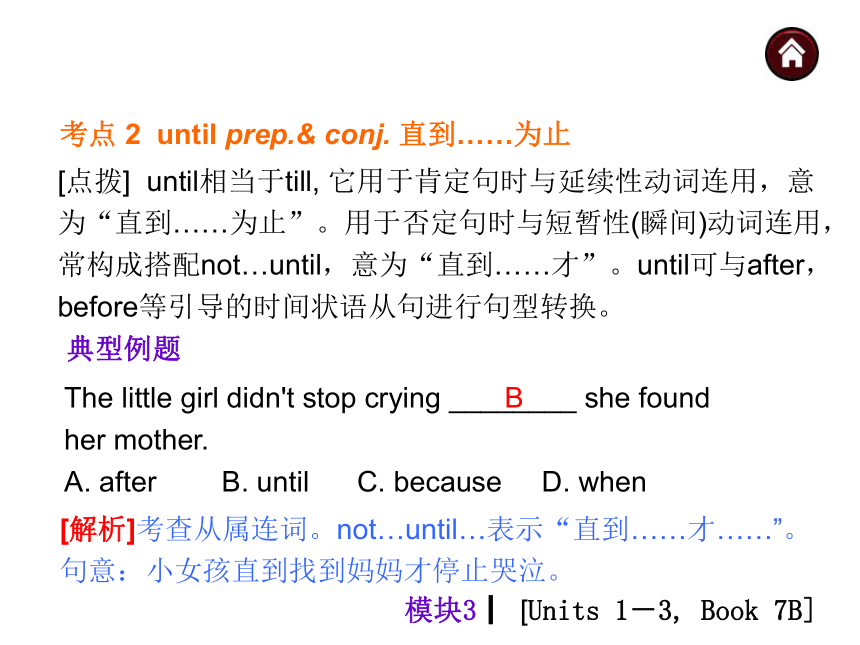
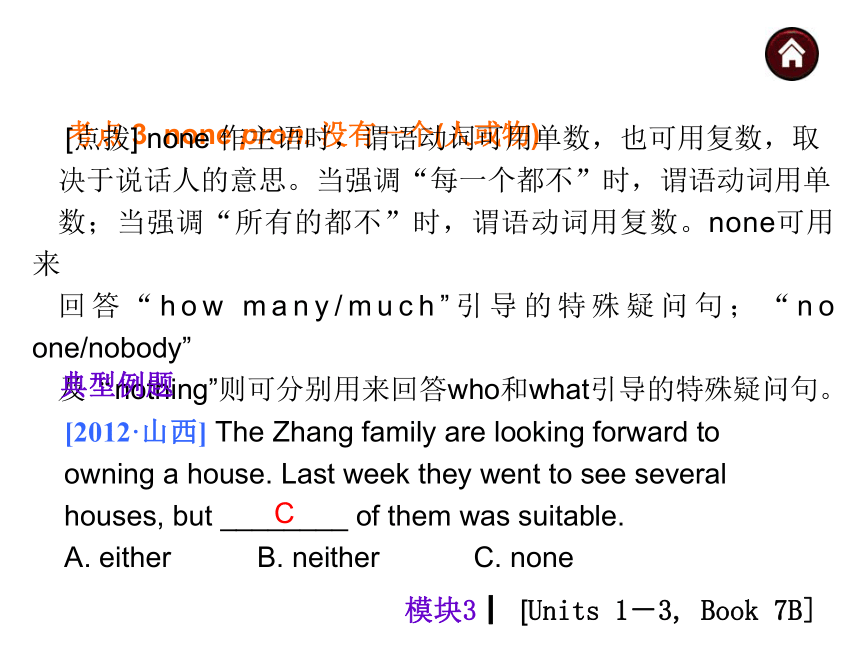
文档简介
课件33张PPT。模块3 [Units 1—3, Book 7B] 模块3┃ [Units 1-3, Book 7B] ┃基础精梳理 ┃模块3┃ [Units 1-3, Book 7B] 模块3┃ [Units 1-3, Book 7B] 模块3┃ [Units 1-3, Book 7B] 模块3┃ [Units 1-3, Book 7B] 模块3┃ [Units 1-3, Book 7B] 模块3┃ [Units 1-3, Book 7B] ┃考点巧突破 ┃考点 1 arrive in/at/get(to)/reach 三个词都可以指到达目的地或某个地点。
(1)arrive是不及物动词,后面跟介词in或at才能接宾语。到
达大城市或国家等大地方,常用介词in,到达小地方时用介
词at。
(2)get是不及物动词,后跟宾语时,需加介词to;与地点副
词连用时,无须用介词to。
(3)reach是及物动词,后面直接跟具体地点。模块3┃ [Units 1-3, Book 7B] 典型例题 选出与句中画线部分意思相同或相近的选项
I arrived in Leishan last Sunday.
A. reach B. reached to C. got D. got toD模块3┃ [Units 1-3, Book 7B] 考点 2 until prep.& conj. 直到……为止 [点拨] until相当于till, 它用于肯定句时与延续性动词连用,意
为“直到……为止”。用于否定句时与短暂性(瞬间)动词连用,
常构成搭配not…until,意为“直到……才”。until可与after,
before等引导的时间状语从句进行句型转换。 典型例题 The little girl didn't stop crying ________ she found
her mother.
A. after B. until C. because D. when B[解析]考查从属连词。not…until…表示“直到……才……”。句意:小女孩直到找到妈妈才停止哭泣。模块3┃ [Units 1-3, Book 7B] 考点 3 none pron. 没有一个(人或物) [点拨] none 作主语时,谓语动词可用单数,也可用复数,取
决于说话人的意思。当强调“每一个都不”时,谓语动词用单
数;当强调“所有的都不”时,谓语动词用复数。none可用来
回答“how many/much”引导的特殊疑问句;“no one/nobody”
及“nothing”则可分别用来回答who和what引导的特殊疑问句。 典型例题 [2012·山西] The Zhang family are looking forward to
owning a house. Last week they went to see several
houses, but ________ of them was suitable.
A. either B. neither C. noneC模块3┃ [Units 1-3, Book 7B] 考点 4 life n. 生活;生命 [搭配] lose one's life丧生;all one's life 某人的一生;come
to life 苏醒;save one's life 挽救某人的生命典型例题 小悦悦被送去医院后,很多人努力拯救她的生命。
After Xiao Yueyue was sent to hospital, many people
tried to ________________.save her life 模块3┃ [Units 1-3, Book 7B] 考点 5 drive vt. & vi. 驾驶 [点拨] drive的名词形式为driver,意为“驾驶员”。
[搭配] drive to… 开车前往……;drive sb to… 开车送
某人去……典型例题 He wants to be a bus________(司机) like his
grandfather.driver 模块3┃ [Units 1-3, Book 7B] 考点 6 fail vt. 使失望;不及格;vi. 失败,不及格;忘记[点拨] fail的名词形式为failure; 其反义词是succeed。
[搭配] fail to do sth 做某事失败; fail (in) the exam
没通过考试典型例题 汤姆没通过考试。他看上去有点不高兴。
Tom ________________. He looks unhappy.failed (in) the exam 模块3┃ [Units 1-3, Book 7B] 考点 7 surprised adj. 吃惊的,惊讶的 [点拨] surprised的主语一般是人,指人对某事/物“感到吃
惊”。be surprised to do sth=be surprised at (doing) sth
意为“对(做)某事感到惊讶”;surprising (adj.)意为“令人惊
讶的”,一般用来修饰物,指某物使人“感到吃惊”;
Surprise (v.)意为“使……惊讶”;surprise (n.)意为“惊讶,
惊喜“。如:to one's surprise令某人吃惊的是……模块3┃ [Units 1-3, Book 7B] 典型例题 The fans were________ to know the death of their
favorite singing star Whitney Houston.
A.glad B.angry
C.excited D.surprisedD模块3┃ [Units 1-3, Book 7B] 考点 8 join/take part in/attend (1)join意为“参加,加入”;指参加某个组织,成为其中的一
员或加入某些人的行列并一起从事某种活动。join 可以和
in连用,一般指参加某次体育活动。join in与take part in在
意思和用法上基本相同。
(2)take part in指参加某次活动,并在活动中起一定作用。
take an active part in…意为“积极参加……”。
(3)attend+sth出席/上课…… 侧重出席到场。模块3┃ [Units 1-3, Book 7B] 典型例题 She _______ the sports meeting yesterday.
A.attended B.joined
C.joined in D.took partC模块3┃ [Units 1-3, Book 7B] 考点 9 bring/take/fetch (1)bring意为“拿来;带来”, 指从别处带到说话处。(与
come 同方向)
(2)take意为“拿去;带去”, 指从说话处带到别处,它与
bring 所表示的方向相反。(与go同方向)
(3)fetch意为“去拿来”,即包括“去”的意思, 又包括“来”的
意思。(=go and bring back)典型例题 Don't forget to ________ your books to school.bring 模块3┃ [Units 1-3, Book 7B] 考点 10 afraid adj. 害怕的 [点拨] be afraid to do sth 意为“害怕做某事”,着重指“因害
怕而不敢去做某事”。be afraid of doing sth 意为“害怕做某
事”,表示“担心某事可能发生”。be afraid+that从句,表
示“引出不好的消息或带有歉意的回绝”。I'm afraid not/so.
恐怕(不)是这样。常用来回答对方的问题,语气较委婉。典型例题 —Excuse me. Is the museum open every day?
— ________. It's only open from Monday to Friday.
A. Yes, of course B. That's right
C. I'm not sure D. I'm afraid notD模块3┃ [Units 1-3, Book 7B] ┃智能双提升 ┃基础过关 Ⅰ. 根据汉语提示完成句子
1.There is a bridge ________ (在上方) the river.
2.The bus is ________(满的). We have to wait for the
next one.
3.Tom is walking ________ (朝着) the post office.
4.Heilongjiang is in the ___________ (东北) part of
China.
5.You can ask him to ________(分享) his happiness
with you..over full stoward northeastern share 模块3┃ [Units 1-3, Book 7B] 6.There is less air ________(污染) in the country than in
the city.
7.I'm ________ (真的) interested in playing football.
8.It's convenient to take the ____________(地铁) in most
big cities.
9.There are two ________ (入口) in the theatre.
10.Go ________(径直) on and you'll find the No.1 hospital
on your right.pollution really underground entrances straight 模块3┃ [Units 1-3, Book 7B] Ⅱ. 用所给词的适当形式填空
1.The old man is going ________ (cross) the road. Let's
help him.
2.The woman looked ________ (happy) at her lovely son.
3.________ (luck), I lost my wallet on my way to school.
4.Look! There are many ________ (gold) clouds in the
sky.
5.I want to buy two ________ (loaf) of bread and three
glasses of juice.across happily Unluckily golden loaves 模块3┃ [Units 1-3, Book 7B] 6.His grandpa still lives in a ________ (wood) house.
7.On the ________ (twelve) of August, I'll go to
America by air.
8.There are many beautiful Chinese ________ (paint)
in the museum.
9.We are looking forward to ________ (have) a holiday
without homework.
10.I was really ________ (surprise) to find that the girl
was deaf.wooden twelfthpaintings having surprised 模块3┃ [Units 1-3, Book 7B] Ⅲ. 用方框中所给词或短语的适当形式填空
1.My mother cooks food _______________ every day.
2.The girl __________dogs and she never gets close to
them.
3.It's impolite to ________ others when they are in
trouble.
4.I am ________ interested in playing Chinese chess.
5. We must try our best to reduce levels of
environmental________.in the kitchen is afraid of laugh at really pollution模块3┃ [Units 1-3, Book 7B] Ⅳ. 根据汉语意思完成句子
1.汤姆迫不及待地打开电视机。
Tom ___________________ the TV.
2.我可以同时看电视和做作业吗?
Can I watch TV and do my homework ______________?
3.今天阳光明媚,我将带你去参观我的家乡。
It's sunny today. And I'll __________________________.
4.在第三个十字路口向左拐,你就会发现那家医院。
__________________ on the left, you'll find that hospital.
5.他很累,想停下来休息一会儿。
He is very tired and wants to ______________a rest.can't wait to turn on at the same time show you around my hometown Take the third crossing stop to have 模块3┃ [Units 1-3, Book 7B] 中考透视 Ⅰ. 单项选择
( )1. [2013·淮安] Susan lives on the ________ floor
and we are neighbours.
A. four B. fourth C. fourteen D. forty
( )2. [2013·扬州] —Wow! You've got so many clothes.
—But ________of them are in fashion now.
A.all B.Both C.neither D.none
( )3. [2013·淮安] —Will you go to the cinema with me
tomorrow?
—Sorry, I ________ skating with Tom.
A. go B. went C. have gone D. will goB D D 模块3┃ [Units 1-3, Book 7B] ( )4. [2013·常州] —Have you got any books on English
grammar? I want to borrow________.
—Yes, here you are. But you must return it by
Friday.
A. one B. it C. some D. that
( )5. [2013·衢州] —Our skirts look the same.
—Yes, but ________ looks newer.
A. your B. yours C. you D. yourself
A B 模块3┃ [Units 1-3, Book 7B] ( )6. [2013·宁波] —Excuse me, is this _______ iPad mini?
—No, it isn't. _______is at home.
A. your; Mine B. your; My
C. yours; My D. yours; Mine
( )7. [2013·内江] The old man is a good swimmer, and
even now he often swims _______ Tuojiang River
after supper.
A. over B. through C.to D. acrossA D 模块3┃ [Units 1-3, Book 7B] ( )8. [2013·丽水] —Hey, man. You can't cross the street
now. You have to wait ______ the traffic lights turn
green.
—Oh, sorry and thank you.
A. when B. after C.until D. whileC 模块3┃ [Units 1-3, Book 7B] ( )9. [2013·武汉] —What does the instruction say?
—The colors in the dress will________ if you use
hot water.
A.fall B.appear C.run D.shineC [解析] 考查动词辨析。fall意为“降落,落下”;appear意为“出现”;run意为“跑,掉色(指衣服上的染料或颜色)”;shine意为“发光”。由下文“if you use hot water”可知裙子放在热水中会褪色。故选C。模块3┃ [Units 1-3, Book 7B] ( )10. [2013·成都] It's the boy's ________ birthday
today. He is five years old now.
A.fifteen B.Fifth C.fiveB Ⅱ. 根据所给提示完成句子
1.[2013·盐城] World Environment Day is on the________
(five) of June.
2.[2013·云南] The ________ China-South Asia Expo
opened in Kunming on June 6, 2013.(one)
3.[2013·新疆] It's very dangerous to d________ after you
drink wine.
4.[2013·盐城] What a________ (sun) day! Let's go hiking. fifth first drive sunny
(1)arrive是不及物动词,后面跟介词in或at才能接宾语。到
达大城市或国家等大地方,常用介词in,到达小地方时用介
词at。
(2)get是不及物动词,后跟宾语时,需加介词to;与地点副
词连用时,无须用介词to。
(3)reach是及物动词,后面直接跟具体地点。模块3┃ [Units 1-3, Book 7B] 典型例题 选出与句中画线部分意思相同或相近的选项
I arrived in Leishan last Sunday.
A. reach B. reached to C. got D. got toD模块3┃ [Units 1-3, Book 7B] 考点 2 until prep.& conj. 直到……为止 [点拨] until相当于till, 它用于肯定句时与延续性动词连用,意
为“直到……为止”。用于否定句时与短暂性(瞬间)动词连用,
常构成搭配not…until,意为“直到……才”。until可与after,
before等引导的时间状语从句进行句型转换。 典型例题 The little girl didn't stop crying ________ she found
her mother.
A. after B. until C. because D. when B[解析]考查从属连词。not…until…表示“直到……才……”。句意:小女孩直到找到妈妈才停止哭泣。模块3┃ [Units 1-3, Book 7B] 考点 3 none pron. 没有一个(人或物) [点拨] none 作主语时,谓语动词可用单数,也可用复数,取
决于说话人的意思。当强调“每一个都不”时,谓语动词用单
数;当强调“所有的都不”时,谓语动词用复数。none可用来
回答“how many/much”引导的特殊疑问句;“no one/nobody”
及“nothing”则可分别用来回答who和what引导的特殊疑问句。 典型例题 [2012·山西] The Zhang family are looking forward to
owning a house. Last week they went to see several
houses, but ________ of them was suitable.
A. either B. neither C. noneC模块3┃ [Units 1-3, Book 7B] 考点 4 life n. 生活;生命 [搭配] lose one's life丧生;all one's life 某人的一生;come
to life 苏醒;save one's life 挽救某人的生命典型例题 小悦悦被送去医院后,很多人努力拯救她的生命。
After Xiao Yueyue was sent to hospital, many people
tried to ________________.save her life 模块3┃ [Units 1-3, Book 7B] 考点 5 drive vt. & vi. 驾驶 [点拨] drive的名词形式为driver,意为“驾驶员”。
[搭配] drive to… 开车前往……;drive sb to… 开车送
某人去……典型例题 He wants to be a bus________(司机) like his
grandfather.driver 模块3┃ [Units 1-3, Book 7B] 考点 6 fail vt. 使失望;不及格;vi. 失败,不及格;忘记[点拨] fail的名词形式为failure; 其反义词是succeed。
[搭配] fail to do sth 做某事失败; fail (in) the exam
没通过考试典型例题 汤姆没通过考试。他看上去有点不高兴。
Tom ________________. He looks unhappy.failed (in) the exam 模块3┃ [Units 1-3, Book 7B] 考点 7 surprised adj. 吃惊的,惊讶的 [点拨] surprised的主语一般是人,指人对某事/物“感到吃
惊”。be surprised to do sth=be surprised at (doing) sth
意为“对(做)某事感到惊讶”;surprising (adj.)意为“令人惊
讶的”,一般用来修饰物,指某物使人“感到吃惊”;
Surprise (v.)意为“使……惊讶”;surprise (n.)意为“惊讶,
惊喜“。如:to one's surprise令某人吃惊的是……模块3┃ [Units 1-3, Book 7B] 典型例题 The fans were________ to know the death of their
favorite singing star Whitney Houston.
A.glad B.angry
C.excited D.surprisedD模块3┃ [Units 1-3, Book 7B] 考点 8 join/take part in/attend (1)join意为“参加,加入”;指参加某个组织,成为其中的一
员或加入某些人的行列并一起从事某种活动。join 可以和
in连用,一般指参加某次体育活动。join in与take part in在
意思和用法上基本相同。
(2)take part in指参加某次活动,并在活动中起一定作用。
take an active part in…意为“积极参加……”。
(3)attend+sth出席/上课…… 侧重出席到场。模块3┃ [Units 1-3, Book 7B] 典型例题 She _______ the sports meeting yesterday.
A.attended B.joined
C.joined in D.took partC模块3┃ [Units 1-3, Book 7B] 考点 9 bring/take/fetch (1)bring意为“拿来;带来”, 指从别处带到说话处。(与
come 同方向)
(2)take意为“拿去;带去”, 指从说话处带到别处,它与
bring 所表示的方向相反。(与go同方向)
(3)fetch意为“去拿来”,即包括“去”的意思, 又包括“来”的
意思。(=go and bring back)典型例题 Don't forget to ________ your books to school.bring 模块3┃ [Units 1-3, Book 7B] 考点 10 afraid adj. 害怕的 [点拨] be afraid to do sth 意为“害怕做某事”,着重指“因害
怕而不敢去做某事”。be afraid of doing sth 意为“害怕做某
事”,表示“担心某事可能发生”。be afraid+that从句,表
示“引出不好的消息或带有歉意的回绝”。I'm afraid not/so.
恐怕(不)是这样。常用来回答对方的问题,语气较委婉。典型例题 —Excuse me. Is the museum open every day?
— ________. It's only open from Monday to Friday.
A. Yes, of course B. That's right
C. I'm not sure D. I'm afraid notD模块3┃ [Units 1-3, Book 7B] ┃智能双提升 ┃基础过关 Ⅰ. 根据汉语提示完成句子
1.There is a bridge ________ (在上方) the river.
2.The bus is ________(满的). We have to wait for the
next one.
3.Tom is walking ________ (朝着) the post office.
4.Heilongjiang is in the ___________ (东北) part of
China.
5.You can ask him to ________(分享) his happiness
with you..over full stoward northeastern share 模块3┃ [Units 1-3, Book 7B] 6.There is less air ________(污染) in the country than in
the city.
7.I'm ________ (真的) interested in playing football.
8.It's convenient to take the ____________(地铁) in most
big cities.
9.There are two ________ (入口) in the theatre.
10.Go ________(径直) on and you'll find the No.1 hospital
on your right.pollution really underground entrances straight 模块3┃ [Units 1-3, Book 7B] Ⅱ. 用所给词的适当形式填空
1.The old man is going ________ (cross) the road. Let's
help him.
2.The woman looked ________ (happy) at her lovely son.
3.________ (luck), I lost my wallet on my way to school.
4.Look! There are many ________ (gold) clouds in the
sky.
5.I want to buy two ________ (loaf) of bread and three
glasses of juice.across happily Unluckily golden loaves 模块3┃ [Units 1-3, Book 7B] 6.His grandpa still lives in a ________ (wood) house.
7.On the ________ (twelve) of August, I'll go to
America by air.
8.There are many beautiful Chinese ________ (paint)
in the museum.
9.We are looking forward to ________ (have) a holiday
without homework.
10.I was really ________ (surprise) to find that the girl
was deaf.wooden twelfthpaintings having surprised 模块3┃ [Units 1-3, Book 7B] Ⅲ. 用方框中所给词或短语的适当形式填空
1.My mother cooks food _______________ every day.
2.The girl __________dogs and she never gets close to
them.
3.It's impolite to ________ others when they are in
trouble.
4.I am ________ interested in playing Chinese chess.
5. We must try our best to reduce levels of
environmental________.in the kitchen is afraid of laugh at really pollution模块3┃ [Units 1-3, Book 7B] Ⅳ. 根据汉语意思完成句子
1.汤姆迫不及待地打开电视机。
Tom ___________________ the TV.
2.我可以同时看电视和做作业吗?
Can I watch TV and do my homework ______________?
3.今天阳光明媚,我将带你去参观我的家乡。
It's sunny today. And I'll __________________________.
4.在第三个十字路口向左拐,你就会发现那家医院。
__________________ on the left, you'll find that hospital.
5.他很累,想停下来休息一会儿。
He is very tired and wants to ______________a rest.can't wait to turn on at the same time show you around my hometown Take the third crossing stop to have 模块3┃ [Units 1-3, Book 7B] 中考透视 Ⅰ. 单项选择
( )1. [2013·淮安] Susan lives on the ________ floor
and we are neighbours.
A. four B. fourth C. fourteen D. forty
( )2. [2013·扬州] —Wow! You've got so many clothes.
—But ________of them are in fashion now.
A.all B.Both C.neither D.none
( )3. [2013·淮安] —Will you go to the cinema with me
tomorrow?
—Sorry, I ________ skating with Tom.
A. go B. went C. have gone D. will goB D D 模块3┃ [Units 1-3, Book 7B] ( )4. [2013·常州] —Have you got any books on English
grammar? I want to borrow________.
—Yes, here you are. But you must return it by
Friday.
A. one B. it C. some D. that
( )5. [2013·衢州] —Our skirts look the same.
—Yes, but ________ looks newer.
A. your B. yours C. you D. yourself
A B 模块3┃ [Units 1-3, Book 7B] ( )6. [2013·宁波] —Excuse me, is this _______ iPad mini?
—No, it isn't. _______is at home.
A. your; Mine B. your; My
C. yours; My D. yours; Mine
( )7. [2013·内江] The old man is a good swimmer, and
even now he often swims _______ Tuojiang River
after supper.
A. over B. through C.to D. acrossA D 模块3┃ [Units 1-3, Book 7B] ( )8. [2013·丽水] —Hey, man. You can't cross the street
now. You have to wait ______ the traffic lights turn
green.
—Oh, sorry and thank you.
A. when B. after C.until D. whileC 模块3┃ [Units 1-3, Book 7B] ( )9. [2013·武汉] —What does the instruction say?
—The colors in the dress will________ if you use
hot water.
A.fall B.appear C.run D.shineC [解析] 考查动词辨析。fall意为“降落,落下”;appear意为“出现”;run意为“跑,掉色(指衣服上的染料或颜色)”;shine意为“发光”。由下文“if you use hot water”可知裙子放在热水中会褪色。故选C。模块3┃ [Units 1-3, Book 7B] ( )10. [2013·成都] It's the boy's ________ birthday
today. He is five years old now.
A.fifteen B.Fifth C.fiveB Ⅱ. 根据所给提示完成句子
1.[2013·盐城] World Environment Day is on the________
(five) of June.
2.[2013·云南] The ________ China-South Asia Expo
opened in Kunming on June 6, 2013.(one)
3.[2013·新疆] It's very dangerous to d________ after you
drink wine.
4.[2013·盐城] What a________ (sun) day! Let's go hiking. fifth first drive sunny
